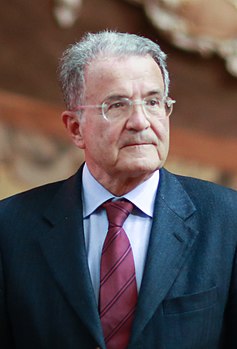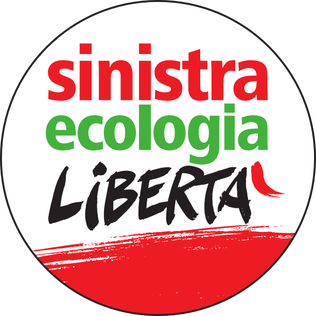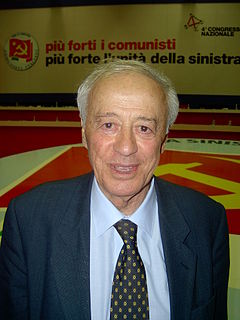
Romano Prodi is an Italian politician who served as the 10th President of the European Commission from 1999 to 2004. He served twice as Prime Minister of Italy, first from 17 May 1996 to 21 October 1998 and then from 17 May 2006 to 8 May 2008. He is considered the founder of the Italian centre-left and one of the most prominent and iconic figures of the so-called Second Republic. Prodi is often nicknamed Il Professore due to his academic career.

The Party of Italian Communists was a communist party in Italy founded in October 1998 as a split from the Communist Refoundation Party (PRC) led by Armando Cossutta, the founder and early leader of the PRC. In December 2014, the party was transformed into Communist Party of Italy (PCd'I), which would later evolve into the re-edition of the Italian Communist Party (PCI).

Fausto Bertinotti is an Italian politician who led the Communist Refoundation Party from 1994 to 2006. On 29 April 2006, after the centre-left coalition's victory in the Italian general election, he was elected President of the Chamber of Deputies, a position he held until 2008.

Nicola "Nichi" Vendola is an Italian left-wing politician and LGBT activist who was a Member of the Chamber of Deputies from Apulia from 1992 to 2005 and President of Apulia from 2005 to 2015. He is one of the first openly LGBT Italian politicians and the first openly LGBT heads of a regional government in Italy.

A snap national general election was held in Italy on 21 April 1996 to elect members of the Chamber of Deputies and the Senate of the Republic. Romano Prodi, leader of the centre-left coalition The Olive Tree, won the election, narrowly defeating Silvio Berlusconi, who led the Pole for Freedoms centre-right coalition.

The Italian presidential election of 2006 was held on 8–10 May 2006. The result was the election of Giorgio Napolitano, the first time a former member of the Italian Communist Party had been elected to the Presidency of the Italian Republic.

Francesco "Franco" Giordano is an Italian politician.

General elections were held in Italy on 5 and 6 April 1992 to select the Eleventh Republican Parliament. They were the first without the traditionally second most important political force in Italian politics, the Italian Communist Party (PCI), which had been disbanded in 1991. Most of its members split between the more democratic-socialist oriented Democratic Party of the Left (PDS), while a minority who did not want to renounce the communist tradition became the Communist Refoundation Party (PRC). However, between them they gained around 4% less than what the already declining PCI had obtained in the 1987 Italian general election, despite PRC absorbing the disbanded Proletarian Democracy (DP).
The Bertinottiani were an Italian political faction around Fausto Bertinotti, the leader of the Communist Refoundation Party (PRC) from 1993 to 2006.

Massimo D'Alema is an Italian politician who was the 53rd Prime Minister from 1998 to 2000. Later he was Deputy Prime Minister and Minister of Foreign Affairs from 2006 to 2008. He is also a journalist and served for a time as national secretary of the Democratic Party of the Left (PDS). Sometimes media refers to him as Leader Maximo, due to his first name Massimo, but also for his dominant position in the left-wing coalitions during the Second Republic. Earlier in his career he was a member of the Italian Communist Party, and he was the first former communist to become prime minister of a NATO country and yet the only former communist prime minister of Italy.

Refoundation for the Left was a faction within the Communist Refoundation Party, a political party in Italy. Most of its members launched the Movement for the Left (MpS) in late January 2009. Another part of its members decided not to leave the Party, "going on with the Refoudation process".
Refoundation in Movement was a faction within the Communist Refoundation Party in Italy.
Being Communists was a faction within the Communist Refoundation Party in Italy. It was formed in 1998 by former followers of Armando Cossutta, who left the party in 1998 to form the Party of Italian Communists. The leader of the group was Claudio Grassi.

Left Ecology Freedom was a democratic socialist political party in Italy whose bulk was formed by former members of the Communist Refoundation Party.

Sergio Garavini was an Italian politician, writer and trade unionist.

The Communist Refoundation Party is a communist political party in Italy that emerged from a split of the Italian Communist Party (PCI) in 1991. The party's secretary is Maurizio Acerbo, who replaced Paolo Ferrero in 2017. Armando Cossutta was the party's founder, while Fausto Bertinotti its longest-serving leader (1994–2008). The latter transformed the PRC from a traditional communist party into a collector of radical social movements.

Italian Left is a left-wing political party in Italy.

Maurizio Acerbo, is an Italian politician and the current Secretary of the Communist Refoundation Party.

Free and Equal is a left-wing parliamentary group in the Chamber of Deputies and a sub-group in the Senate, the two houses of the Italian Parliament. LeU was launched on 3 December 2017 as a federation of political parties including the Article 1 – Democratic and Progressive Movement, Italian Left and Possible. The leader of the alliance for the 2018 general election was Pietro Grasso, former President of the Senate and former anti-Mafia prosecutor. The three founding parties left the alliance in late 2018, but LeU continued to exist in Parliament.

Antonino Cuffaro was an Italian politician.

















